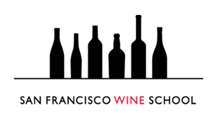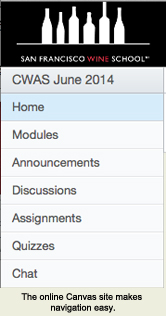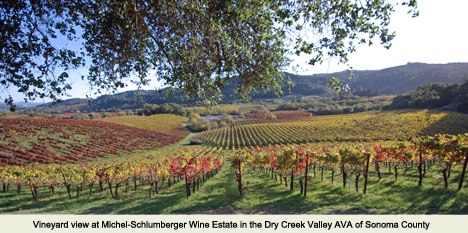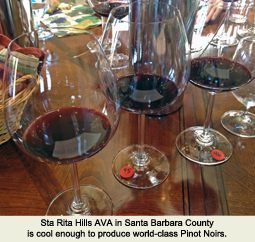California Wine Appellation Specialist Class
by
Terry Sullivan
 Online wine classes provide an educational vehicle for wine enthusiasts to learn about different aspects of wine. The San Francisco Wine School offers several wine courses, one, the California Wine Appellation Specialist (CWAS), is offered in San Francisco and online.
Online wine classes provide an educational vehicle for wine enthusiasts to learn about different aspects of wine. The San Francisco Wine School offers several wine courses, one, the California Wine Appellation Specialist (CWAS), is offered in San Francisco and online.
Class Structure
Of the ten classes that make up the course, eight are content classes that focus on different wine regions of California and their appellations and sub-appellations. The first class is an orientation class that focuses on the wine tasting method, general information about California wine and wine law. The tenth class is the final exam, 100 multiple choice questions that you have 60 minutes to complete.
 The class content is made available on Canvas (via the Internet) on Monday. You have a week to complete the class work; however, one discussion assignment is due on Wednesday. It is expected that you will spend several hours per week on the class. I’ve been spending about eight hours. The week is a good amount of time to synthesize the class content and complete all activities. It is probably best to stretch out the requirements over a few days than try to do everything on one day.
The class content is made available on Canvas (via the Internet) on Monday. You have a week to complete the class work; however, one discussion assignment is due on Wednesday. It is expected that you will spend several hours per week on the class. I’ve been spending about eight hours. The week is a good amount of time to synthesize the class content and complete all activities. It is probably best to stretch out the requirements over a few days than try to do everything on one day.
My first task on Monday is to read the announcement the instructor made. I then read the discussion assignment that is due on Wednesday. The instructor introduces a topic or asks a question. We are to respond to the instructor’s statement or question in the discussion section of Canvas. My next task is to view the course content for that week in the Modules section of Canvas. The weekly module is a presentation of slides narrated by the instructor. I then make flash cards to quiz myself on the content.
On Tuesday I usually respond to the discussion question. For the remainder of the week, I visit the discussion area to read what others in the class have posted. We are required to respond to two other posts during the week.
The assignment for the eight content classes was to taste two wines from different appellations discussed in that week’s content. For seven of the sessions, I wrote tasting notes. One session did require us to make a video with our comments about the wines. After I figure out what to do about getting the wines, I make a journey to my wine cellar, local wine store or a Total Wine store, a bit of a longer trek.
The last task for the week is to take the weekly quiz. On occasion, I add additional flash cards if there is a quiz question that I do not have a flash card about. My first quiz took me over ten minutes, subsequent quizzes have been in the five-minute time frame.

Reflections on the Class
Of the wine classes that I have taken, the CWAS was my favorite. The online version was great, and the discussions really added to the class. Back in my days as a lecturer at Towson University, I taught some online classes. I felt then, as now, that online discussions have advantages over face-to-face discussions. In the latter, there is always someone who attempts to hide and not participate. If you want to get credit, you cannot hide online; you have to post to the discussions. Of course there is the concern that some students will post a word or two, but in my experience they seem to write much more than they would ever say in a face-to-face class. Perhaps this is due to the ability to think before you hit the enter key. There may also be a bit of peer pressure involved. It is difficult to write a few words when everyone else is writing paragraphs and essays. A few words stand out. During the discussions, we learn from each other.
Because of the course, I have a much greater understanding of appellations in general and appellations in California in specific. As Kathy and I travel and write about wineries around the world, we can key into the concept of appellations. Also because of this course, we plan to visit many of the California appellations that we have not yet visited. For 2014 that will include Lodi, Clarksburg, Santa Barbara County and its sub-appellations. With almost half of the wineries in the United States located in California, there is much to be discovered.
 While studying appellations, one also studies geography and climate. I have a much better understanding of how some areas of California are cool enough for Pinot Noir and Chardonnay, while just a few miles away it is hot enough for Bordeaux and Rhone varieties. Although it did help to be in Lompoc at the beginning of July and notice that pools were vacated in late afternoon and a cool mist was in the air covering vineyards in the morning.
While studying appellations, one also studies geography and climate. I have a much better understanding of how some areas of California are cool enough for Pinot Noir and Chardonnay, while just a few miles away it is hot enough for Bordeaux and Rhone varieties. Although it did help to be in Lompoc at the beginning of July and notice that pools were vacated in late afternoon and a cool mist was in the air covering vineyards in the morning.
This course had an exam at the end. I studied for the exam by making flash cards and Kathy helped quiz me. For my next online class I will create all flash cards on my phone. Flash cards were necessary to help memorize many of the important facts. The exam consisted of 100 multiple choice questions. You had 60 minutes to complete the exam. I discovered that I answered all the questions in 40 minutes. I then went back and re-evaluated my responses for a few of the questions. I only made two errors on the exam questions and one was because I did not read the question as carefully as I should have.
This online class could be a model for additional classes that are taught at the San Francisco Wine School. People took the online class from throughout the country. The school offers many more classes, but one needs to travel to San Francisco to take most of the classes. Teaching the class online opens the class up to people from throughout the United States as well as other countries. The sessions were a week apart. For eight of the sessions you had to buy two wines and write about them. You actually find yourself enjoying homework.
The pacing of a week provided ample time to synthesis the content and memorize the facts. Cramming the class into a weekend would work for some people, but would overwhelm many others. The weekly pacing fit well.
I hope the San Francisco Wine School would consider offering other classes online. I always felt there is a bit of a gap in wine education in the United States. Not everyone is interested in formal college viticulture and oenology courses. Likewise not everyone is interested in sommelier tracks or master of wine tracks. If you want to learn more about wine especially the appellations in California, consider taking the California Wine Appellation Specialist class through the San Francisco Wine School.
